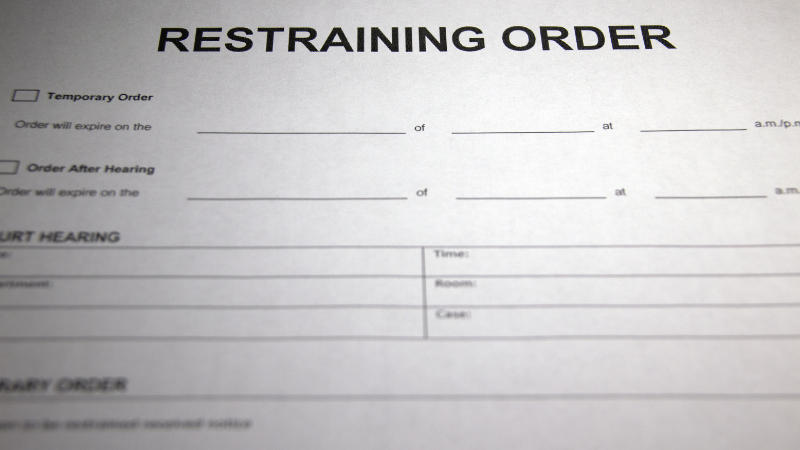What Is a Protective Order in Illinois? Understanding the 3 Types of Orders of Protection
An order of protection is a legal tool designed to help keep individuals and families safe from an abuser. In Illinois, three types of protective orders may be granted when proof of abuse is presented. Understanding what a protective order is and the options available can empower individuals to take the necessary steps to protect themselves and their loved ones.
What Is a Protective Order in Illinois?
An order of protection, also known as a restraining order, is a court order intended to protect individuals and families from abuse or harassment. Domestic abuse victims have access to an order of protection, a legal remedy created by the Illinois Domestic Violence Act.
Individuals, such as disabled adults, spouses, elderly parents, and children, are protected when an order of protection is enforced. Harassment causes emotional distress to the victim and may involve creating disturbances at a school or workplace, following a person, or repeatedly phoning them.

Who Can Request a Protective Order in Illinois?
The petitioner is the individual seeking protection, and the respondent is the person from whom the petitioner seeks protection. Qualifying relationships include families where domestic violence is experienced, as well as romantic couples where one partner may be stalked, threatened, or harassed.
The 3 Main Types of Orders of Protection in Illinois
1. Emergency Order of Protection (EOP)
Peace officers can swiftly request an emergency order of protection for victims of domestic violence, often without notifying the respondent. The judge orders the EOP based on the police officers’ statements. The order is valid for 14 to 21 days and provides the petitioner with immediate safety.
2. Interim Order of Protection
An interim order of protection is a temporary court order designed to offer the petitioner protection until the hearing, when a full (plenary) order is issued. It offers the same protection as a full order of protection, such as restricting contact, and is crucial when immediate danger is present.
3. Plenary Order of Protection
A plenary order of protection provides the petitioner with comprehensive, long-term protection from abuse. A full court hearing is required, whereby the petitioner must provide evidence of the alleged abuse. This full order of protection can provide up to two years of protection.
| Order Type | Purpose | Issued By | Duration | Notes |
|---|---|---|---|---|
| Emergency Order of Protection (EOP) | Immediate safety | Police request; judge approves | 14–21 days | Quick protection without notifying the abuser |
| Interim Order of Protection | Temporary protection until full hearing | Judge | Until the full hearing | Same protections as a full order |
| Plenary Order of Protection | Long-term protection | Judge after a full court hearing | Up to 2 years | Requires evidence; provides full legal protection |
What Protections Do These Orders Provide?
The three aforementioned orders provide several protections to the petitioner. The respondent may be ordered to stay away from the petitioner, have no contact, or be removed from the home. Custody and visitation restrictions may be enforced, or the respondent may be required to surrender firearms.
How to File for an Order of Protection in Illinois
Individuals can file for an order of protection in Illinois by going to the local circuit court clerk’s office, seeking legal aid, or using online tools. They can also work with an attorney to file in civil court. An order may be requested during a criminal prosecution, as well.
Petitioners fill out a Civil No Contact Order or a Stalking No Contact Order form to file a petition against an abuser. They must also file an affidavit that details the specifics of the abuse, such as when it occurred and their reasons to fear the abuser.
If the petitioner is not in immediate danger, they will be given a court date for a hearing. The court date is 5 to 21 days from the time of filing, which is necessary to allow for the respondent to be served with the petition for the order of protection.
What Happens If Someone Violates a Protective Order?
Violating a protective order comes with criminal or civil penalties. A violation is typically deemed a Class A misdemeanor, which can result in jail time or fines. The police are called, and they may arrest the violator, especially if the victim shows them a copy of the order.
Documenting violations serves as evidence when prosecuting the violator. It further strengthens requests for longer and more comprehensive orders of protection when there is a history of violations. Detailed documentation establishes a pattern of behavior and shows the need for ongoing protection.
Protective Orders vs. Other Civil No Contact or Stalking Orders
A victim of domestic violence may seek a protective order, as the abuser has a known relationship with the individual. A Stalking No Contact Order and a Civil No Contact Order, however, are issued when a victim has no relationship with the abuser.
Know Your Rights and Resources
Whether you or someone you know is being threatened or abused, you can file for an emergency order of protection for immediate protection, an interim order of protection before a full hearing, or a plenary order of protection for long-term legal protection.
 Get Expert Legal Advice in Illinois
Get Expert Legal Advice in Illinois
Individuals are urged to seek legal help from a divorce lawyer, such as at Barber Law Offices, LLC. Domestic violence services are additional resources that support victims. Links to court forms can be obtained from state government websites, such as Illinois Courts. The divorce attorneys at Barber Law Offices are available to provide legal intervention when you are a victim of domestic violence. We move quickly to secure an order of protection, safeguard the well-being of you and your family, and ensure the abuser faces the legal consequences of their criminal actions.
We represent current and former spouses, romantic or dating partners, and family members, such as in-laws, parents, step-relatives, and siblings, at court hearings. If someone you know owns a firearm and poses a threat, our lawyers can file an order of protection to obligate them to surrender their weapon. Our lawyers gather evidence, like police reports, to present in court and cooperate with local authorities to bring legal consequences to the violator. We take a firm stance on stalking, harassment, and domestic violence and work to protect you and your family from harm.
Don’t delay in consulting the protective order attorneys at Barber Law Offices. We’ll help secure your immediate safety with emergency filings if you are in danger. Our knowledgeable attorneys serve individuals and families in Schaumburg, Illinois. Call us today for an initial confidential consultation.
FAQs About Orders of Protection in Illinois
What is the difference between an Interim and a Plenary Order?
An Interim Order is temporary until a full court hearing, while a Plenary Order is long-term protection issued after a full hearing.
Do I need a lawyer to get an order of protection?
Not necessarily. You can file on your own, but having a lawyer can make the process easier and ensure all protection is included. Our attorneys at Barber Law Offices handle the orders of protection to make it easier for you.
What protection can an order of protection provide?
It can stop the abusers from contacting you, force them to stay away from your home, and in some cases, affect custody or visitation.
Who can request an order of protection?
Victims of domestic violence or their lawyer can request one, and in emergencies, police can request it on your behalf.
Allen Gabe is an experienced Illinois attorney specializing in family law, bankruptcy, and real estate matters. With over 50 years of experience, he has helped countless clients navigate divorce, child custody, debt relief, and complex legal challenges with compassion and expertise. Recognized for his dedication, Allen has received multiple awards for client satisfaction and is an active member of professional and community organizations in the Chicago suburbs.

 Get Expert Legal Advice in Illinois
Get Expert Legal Advice in Illinois